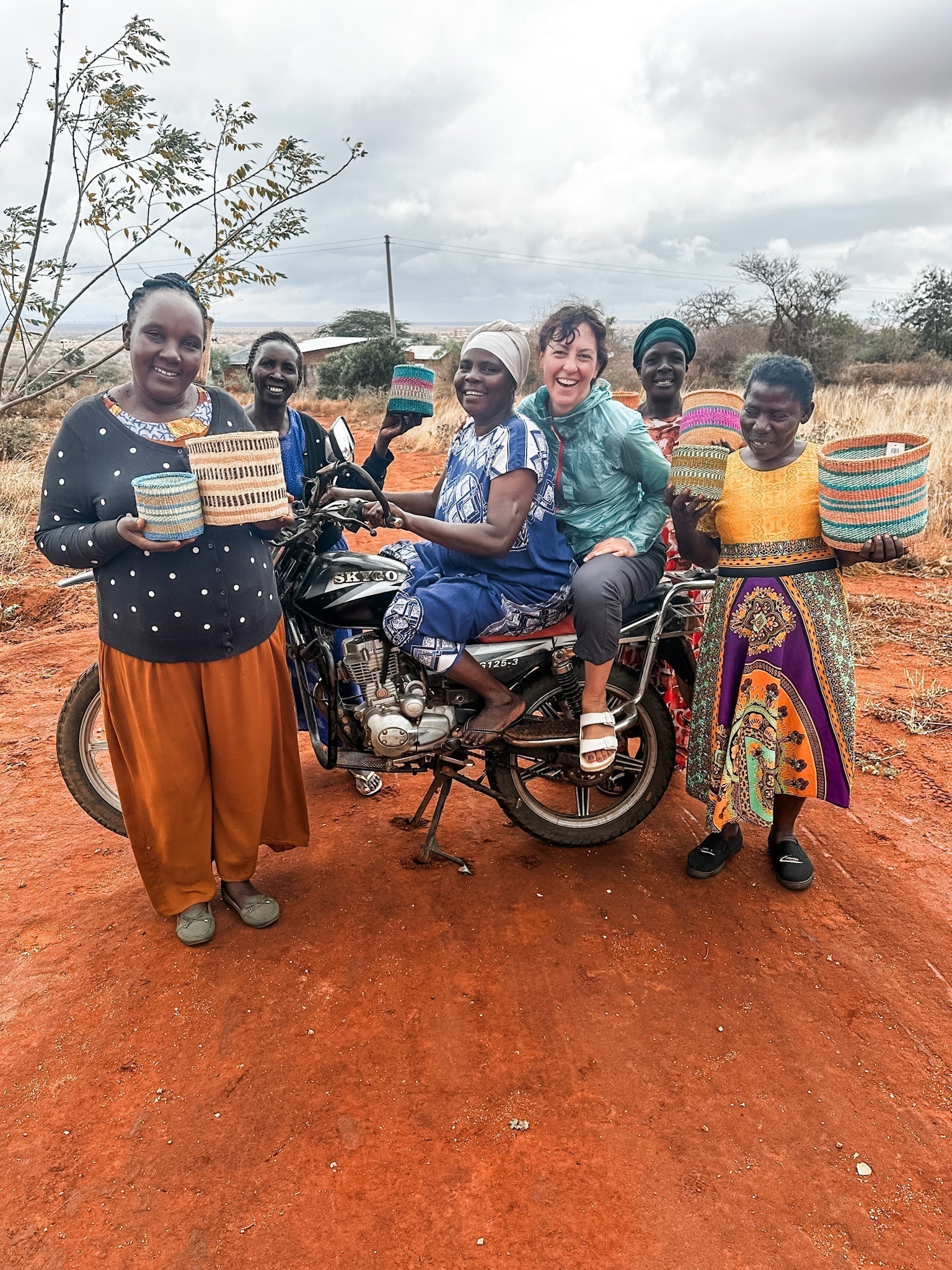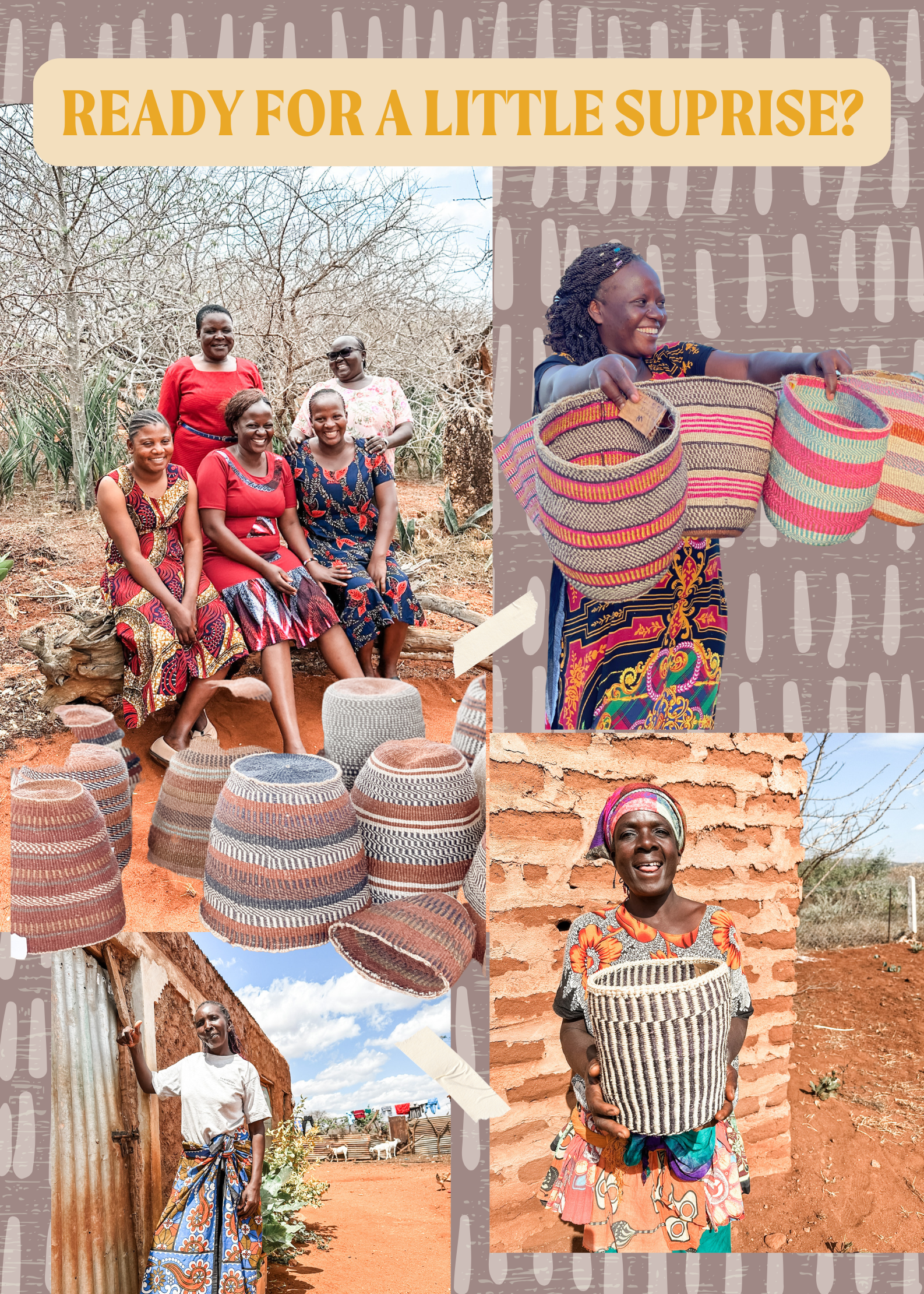

From Basket Lady to Trade Warrior: How African Imports and New Tariffs Are Shaping Zawadisha's Mission
When the pandemic brought our world to a standstill in 2020, Zawadisha faced an existential crisis. Our donors—the lifeblood of our non-profit—suddenly needed to tighten their belts, leaving us scrambling for a sustainable revenue stream. The solution? It was literally woven right before our eyes. The exquisite sisal baskets crafted by the women in our Kenyan community weren't just beautiful artifacts—they represented an untapped opportunity that would transform both our business model and my identity. Little did our founder Jen Gurecki know that pivoting to retail would lead her down a path from desperate non-profit director to "The Basket Lady" at local farmers' markets, while simultaneously drawing her into global trade politics.
Here's how our journey with African-made goods has evolved, the new challenges we're facing with rising tariffs, and how you can help support sustainable, ethical commerce that empowers women across Africa.
One of the main sources of revenue from Zawadisha is the sale of exceptionally handcrafted goods from across Africa, most notably the sisal baskets made by the women in our community. This was not always the case—prior to the pandemic, donations fueled our operations. But when the world shut down, pocketbooks closed up, and we lost most of our monthly donors. Certainly understandable, yet quite a predicament for Zawadisha.
How Jen Became The Basket Lady
One day, as she was walking through the Riverside Farmer's Market in Reno, it dawned on her: Perhaps her calling was to sell baskets out of the side of a van in a parking lot. It was an obvious win-win for Zawadisha. We could both support the women in our community by purchasing baskets from them and our partner Hadithi, while also filling this major gap in our budget. That was the beginning of our foray into retail and her new career as The Basket Lady, and it's been quite successful. We've expanded from one farmers' market to two, launched an e-commerce website, and opened up a micro-retail shop inside Wyld Market. Over the past few years, we've sold tens of thousands of dollars worth of baskets, jewelry, and home goods. And it saved Zawadisha.
Not Amazon and Proud of It
We've experienced our fair share of ups and downs with our retail endeavor, as all small business owners have, and it's become increasingly difficult. There's the competition with Amazon's low prices and free shipping, made possible only by unsafe working conditions, low pay, and other harmful, extractive business practices. You have to fight for people's attention on social media, a never-ending doom scroll of a lousy algorithm that doesn't show you the posts from the people you follow, but only those people who pay Meta ridiculous amounts of money. There has been inflation and a lack of consumer confidence that has negatively impacted sales. And now: tariffs.
How Tariffs Impact Zawadisha
Obviously, we import goods from Africa. Besides the ungodly shipping costs, this has never been an issue, until recently, when Trump decided the trade imbalance with some of the world’s poorest countries is unfair. It’s true, there is a trade imbalance with countries like Lesotho, the tiny landlocked country nestled inside South Africa. But it’s not because they’re trying to take advantage of the United States–it’s because they are devastatingly poor.
When the average citizen makes less than $1,000 USD a year, no one can afford the goods the US could potentially import. Trump himself manufactures in Lesotho, so one must wonder who benefits from the 50% reciprocal tariffs on a country that only exports $237 million to the US (which, at the time of writing, had been delayed for 90 days, but he may not get his nap so…). This is just one example of the many potential tariffs that are cruel, foolish, and not based on any legitimate strategy that will strengthen the US economy.
Today, tariffs stand at 10% across the board, so that means everything Zawadisha sells will be impacted. Importing will be more expensive for us, and it will be for you too because our tiny non-profit cannot absorb the costs. The good news is that everything that is currently in stock on our website, at our micro-retail spot, and at this weekend’s farmer’s market won’t be impacted. But I do have shipments of bike baskets en route from Ghana and recycled glass jars and vases from Zanzibar, and it’s going to be interesting to see how those goods move through customs. No one knows because all of this could change by the time they reach US soil.
What You Can Do
Many of you have been emailing, asking what you can do to help. Here’s a short list:
- Shop with us. It not only supports Zawadisha but also the communities of artisans we work with across Africa. If you’re in Reno, stop by our shop inside Wyld Market or find us at the Riverside Farmer’s Market starting every Sunday in May. Our website is open 24/7 and we ship internationally.
- Join us in Kenya. Might I ask you to be a human mule and bring baskets back to the US? Perhaps. Will you cycle through the most gorgeous landscape next to giraffes and zebras and camp under the stars and lounge on white sand beaches and hang out with the ladies of Zawadisha? Absolutely.
- Donate to Zawadisha. I realize this is not a compelling ask, but I am working on something quite clever that’s going to make Monica giggle, so feel free to wait for that. Or donate $100 or more today and I'll send you one of the baskets I received from Monica a few weeks ago, just before the tariffs went into effect.
- Get engaged. These tariffs–along with all of the other destruction–aren’t going to simply go away on their own. If we stay home and stay quiet, we will sacrifice this country and more. But if we make sacrifices, speak up, and fight, we can resist authoritarianism.
As we navigate these uncertain waters of global trade, one thing remains clear: the connections between Zawadisha, our artisans, and you—our community—matter more than ever. Every basket purchased, every donation made, and every voice raised against harmful policies creates ripples of positive change that extend far beyond our little corner of the world. While I never imagined my journey would lead from traditional non-profit fundraising to selling baskets out of a van and becoming an accidental expert on international tariffs, I've come to embrace this evolution. It's a reminder that our greatest strength lies in adaptation, resilience, and community support. Whether you shop with us, join our Kenya adventure, make a donation, or advocate for fair trade policies, you're helping write the next chapter in Zawadisha's story—one that continues to weave together opportunity, empowerment, and beautiful handcrafted goods despite the obstacles. Together, let's ensure that the hands that create these treasures continue to be lifted up, regardless of what trade policies may come our way.







